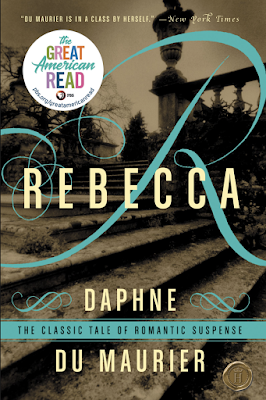"Rebecca" by Daphne Du Maurier (published 1923)
I don't think I've ever eaten as much while reading a novel as I did while reading Daphne Du Maurier's classic Rebecca, first published in 1923. Classic novel it is. Rightly so. Like the unnamed main character, I bit my by fingernails (my right pinky nail, specifically) down to the quick as I thrust pages onto the next in nervous suspense. Down went my crackers, sandwich, cookies, fried rice, chips, and dip. Down went plenty of tea, and much too much coffee, which is what is allowing me to write at this very moment when it typically is bedtime for me.
To me, Du Maurier has captured in this book not just an excellent story but a superb example of what it may be like to be borne unto the world. A birth into the first part of the 20th century, in Britain, to be sure, but a birth nonetheless. The phrase coming-of-age is much to trite for this novel. The birth is a terrible one, of shock and disbelief. The narrator is a kind of still-born (for lack of a better metaphor), thrust into the world without family, both shocked and subdued by the harshness of this Earthly womb, with its jarring, cold characters and it's rugged and beautiful, treacherous and glorious landscape, its people cruel and soft, violent and kind, trust found nowhere - but love abounding looking for its safe place.
Manderly, the house that takes up much of this novel, is the place our main character finds herself in during her early 20s. Born at the turn of the century herself, she grows with the century as the century heads into its own war. Never mind this now, though. Manderly is a great, grand, large British estate of deep historical, family roots. Much of the detail that captured me in the first chapters were descriptions of this place, its plant life, its structure, the flowers which had personalities, the gardens that spoke of omens and foreshadowings, the house that become alive because of the objects within it and the vibes carried by its inhabitants. Much like a fairy-tale without any nonsense.
As a reader I had trouble immediately sympathizing with this creature (the main character), not yet sure of her own mind, because of her tentativeness in decision making and action taking. Yet, I sympathized with her initial plight from the first. She was a companion - a paid companion to an awful, fat woman (and by fat I don't mean outwardly so, but a fat minded and "pig-eyed" - as she is described in the novel - wealthy bourgeois glutton) by the name of Van Hopper. This lady, treating our protagonist a little more than a pet mouse to do her bidding, pays her a great sum each year to care for her, and although surely not in the job description, to also put up with her tiny micro-aggressions against the shy, observant, and obedient personality of her ward. However, as we find out, our unnamed girl is cunning in her own way and practical to a fault. At a hotel in Monte Carlo, she meets a man, Maxim, much older than her, old enough to be her father, and by the end of a few weeks he has proposed to her, promising to bring her to his home: Manderly. And because this man has given her little pieces of happiness that she never has known, and because this man has ensured her survival without the God-awful Van Hopper, and because this man is handsome in his own way, and kind in his own way, and mysterious and capable of love, she accepts. Idiot! I scream in my head, the reader, quite aware that this may not be the best idea and that something terribly wrong must happen in a circumstance like this. Especially because this man, Maxim, was previously married, and our naive protagonist does not think to ask about it. But think, if you were her, in her circumstance, would you want to ruin what seems like your one chance at happiness and freedom? I think not.
And so Du Maurier takes us from the hotel in Monte Carlo (exquisite descriptions of place here too, needless to say) to England's country, to the Manderly home.
(By the way, this book is hilarious. Because one of the little tiny idiosyncrasies of our girl is that she is funny, in a self-deprecating way that doesn't know itself to be self-deprecating. One of my favorite parts is when she becomes super shy and uncomfortable while in the midst of people from the "higher" class and is being asked questions. Oh, ripping, she thought she might say. It's just ripping. Making fun of herself for such as stupid remark. It goes on for quite some time and I laughed plenty. What we come to find is that the main character is actually quite a critical thinker, not just of herself but of others. It is a talent, I think, to think critically without being a judgmental person. And this is a talent that she develops beautifully as the novel progresses, making brilliant commentaries on the superficiality of high society, a society that values cheap thrills, such as costume parties, more than any inner artistry or psychological and emotional depth.)
In Manderly, Jasper the dog becomes one of the main characters, as does Frith, Ben, Beatrice, Giles, and Frank. And the ominous Mrs. Danvers, the house mistress, stark and cruel. The main character's simple crisis is this: how does one live in a home, how does one create a beautiful marriage, how does one love one's life when everyone and everything seems to revolve around one person: Rebecca? Rebecca, the name of Maxim's dead wife. Even in instances when she knows that her husband and almost all other inhabitants of the Manderly home are trying to move ahead, not focus on this horrific past, it is not enough. The house reeks of Rebecca, of her things, of her belongings, her memories, her scent, etc. etc. But she - the main character - is able to go on because she knows a sense of place - in this instance Manderly - that is pure. Not connected to any past, any person. But it as itself. And Du Maurier illustrates this throughout with the dog Jasper, as you will see if you read the book. Jasper, the happy-go-lucky, very needy, very sweet dog. Du Maurier also symbolizes purity with some elements the natural world, which belong not to Rebecca, but belong to the universal realm, a part of the world that only the right person must see. In this book she always remains unnamed.
There is plenty more to discuss but I will not give any spoilers whatsoever. This has been one of the best classics I've ever read in my life. I love the main character and her story and I love the story that surrounds her. It is fiction, as it should be, and should be read as "sensational" fiction which was popular in Britain during that time, but there is quite another element to this that has a spirit I cannot quite grasp: a spirit that knows risk, a spirit that knows the un-containable and unreliable nature of human emotion, a spirit that appreciates life, an appreciation only genuine because it knows that it will die.




Comments
Post a Comment